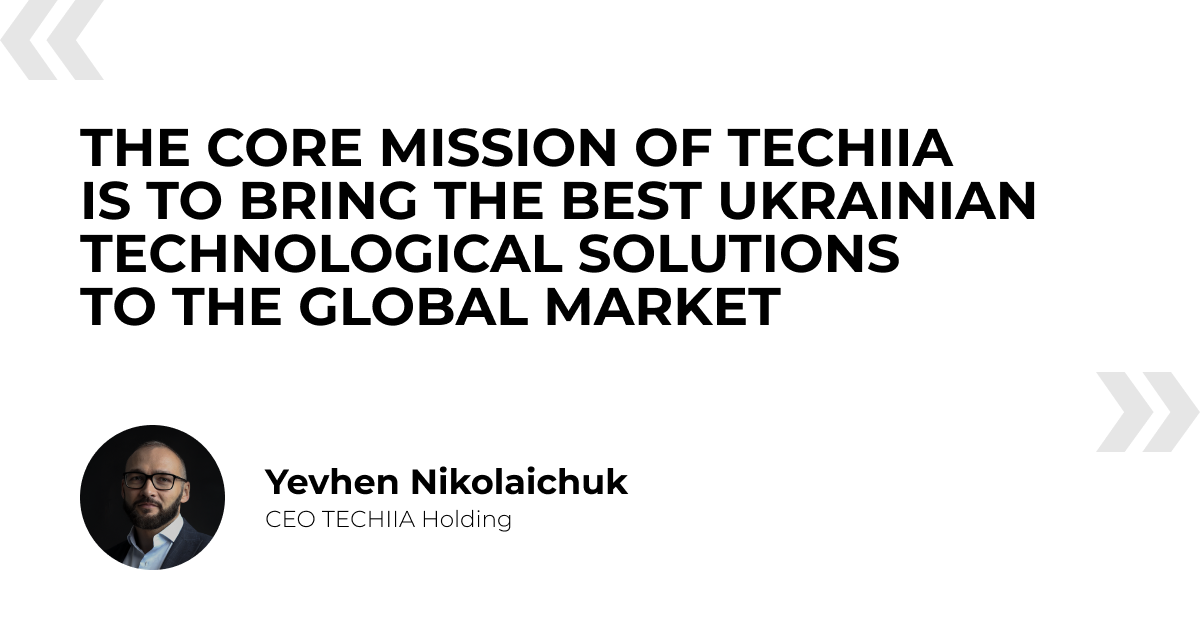
The Brave Business UA project comprises 22 stories from Ukrainian top managers and entrepreneurs about preparing their businesses for war, responding quickly to the initial days of the invasion, and adapting their companies to the realities of military actions. One of the project's heroes is the CEO of TECHIIA holding, Yevhen Nikolaichuk.
Brave Business UA was released in the form of online stories and a book, which is already available for purchase in Ukraine. The project's author, Mykyta Artemchuk, gathered stories that demonstrate the resilience, flexibility, and courage of Ukrainian businesses.
In addition to the TECHIIA holding, representatives from MEGOGO, "Prom.ua," "Rozetka," "Uklon," "Monobank," "Kyivstar," "Nova Poshta," and other companies shared their experiences within the project, showing how they not only survived but also helped others.
How would you describe the state of the industry and the company before the war?
The technology industry was undergoing recovery and stabilization after the COVID-19 period. We felt this impact on our holding, as most of our assets were gaining momentum just before the full-scale invasion by russia.
For example, for WePlay Esports company, the years 2020 and 2021 were the most productive despite the challenging quarantine conditions. The company organized world-class esports events in Kyiv and signed new contracts for video content production. ENESTECH Software, which develops software for computer arenas, was expanding into new markets in Asia and establishing collaborations with US universities. Culver Aviation, which provides remote monitoring and surface analysis services using its own drones, was preparing for the upcoming agricultural season and launching innovative products. Several other projects were unfolding in the Ukrainian market.
In February 2022, we had just finalized new priorities and were at the starting point for several directions.
Was the company prepared for the possibility of war? How exactly?
Let's start with the fact that the war against Ukraine has been ongoing since 2014. Our founders have prioritized diversification since then. The business should not depend on one market or one country; there should be several points of support. Over the past eight years, the founders have implemented this approach, which helped us prepare economically.
Internally, we prepared in terms of mobility and security. The team was trained to work effectively remotely. We had contingency communication channels with various offices. We did not relocate employees in advance, but we conducted briefings for teams so that everyone understood what to do in case of communication loss, where we would gather, and who should be in the office to handle operational matters.
What decisions did the company make regarding the business and the team (staff) in the first hours and first weeks of the war?
The first decision of the owners was to prioritize everyone's safety. Those who could, came to work. Usually, this happened very quickly because, for many, work was an island of stability in the chaos.
Through our NGO "Techiia Foundation," the holding started a large program to support Ukraine's freedom, which is ongoing. We implemented a moratorium on layoffs for two quarters. In the first weeks, we paid an advance for three months to those who needed it. We helped with resettlement in Western Ukraine and with finding accommodations. We had several hubs where people could stay with their families to be in relative safety.
How has the company's product changed or adapted due to the war?
As the holding has various assets, each with its own products, I'll focus on the changes in the assets. Firstly, all businesses immediately severed any contracts and contacts with russia and belarus. Secondly, they accelerated their entry into new markets. For example, ENESTECH Software launched in Vietnam, while WePlay Esports quickly gained positions in the USA. Thirdly, the assets underwent a transformation and released new products. WePlay Esports became WePlay Studios — the old name became too small for the company's huge production expertise. Culver Aviation introduced Menatir, an autonomous aerial monitoring network system using UAVs that can operate with minimal human involvement.
During the full-scale war, TECHIIA acquired several new assets. Among them is Aestech, a company developing unique construction technologies. For instance, their technology allows for frameless glazing of glass facades without the use of frames and aluminum structural frames.
How have management approaches changed due to the war?
We increased demands on the assets and prioritized financial growth. We optimized the interaction between companies, departments, and teams. More functions were decentralized to make assets more versatile in actions, but we rigorously control the achievement of declared targets. There is more freedom and more responsibility instead. Overall, we regularly introduce management changes to maintain business flexibility. The war serves as an additional impetus for such changes.
What is the state of the company after a year and a half of war? What are the plans for the future?
The core mission of TECHIIA is to bring the best Ukrainian technological solutions to the global market. To achieve this, we are undergoing a new iteration of changes. We are focusing on scientific and innovative projects with high added value, scrutinizing asset efficiency, and quickly discarding what is not feasible. The goal is to make the unique products of our assets leaders in new markets.
I'll also mention our social projects. Before the major war, for several years, the holding actively supported medicine through the "Techiia Foundation" public organization. Now we have grown to include several new socially beneficial directions to provide maximum support to Ukrainians during these tragic times. This support goes beyond just humanitarian aid, which amounts to tens of millions of dollars; it also includes assistance with prosthetics and ensuring access to medical care in the de-occupied territories. In the future, we plan to implement recovery programs and educational projects.
What are the main lessons you, as a manager, have learned from the war?
The war is ongoing, so it's still early to talk about final lessons. As an intermediate conclusion, I can say this: value the people you go through difficult times with.


